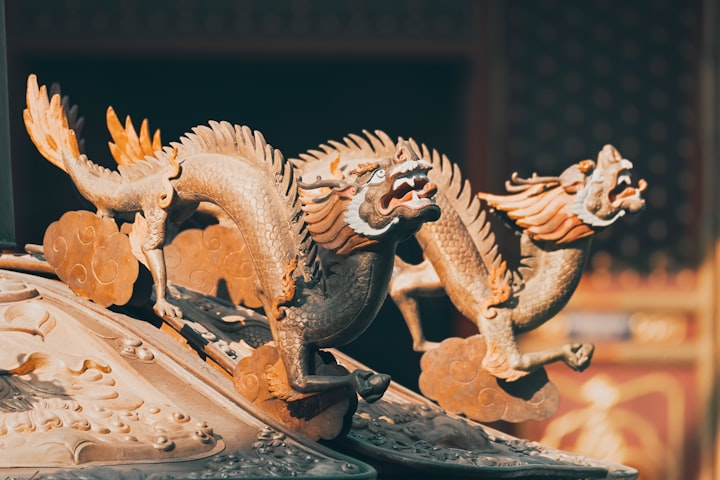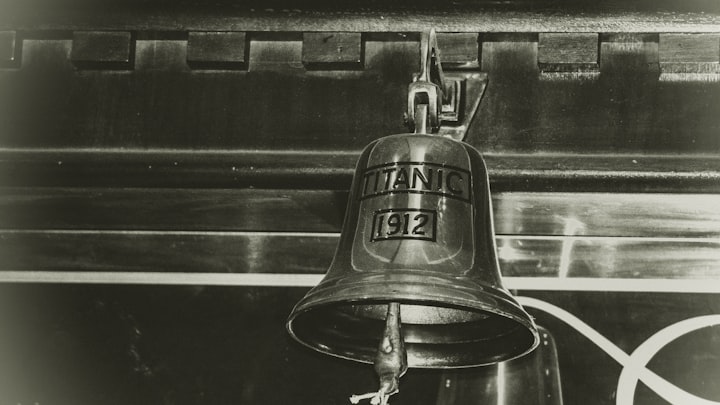Dewi and The Dragons of Pura Beji
A modern Balinese fable

There weren't always dragons in the Valley. In fact, there hadn't been any for a long long time until a Chinese tourist climbed into the forbidden inner sanctum of Dewi Kwan Im’s temple (the Chinese call her Kwan Yin), disturbing the goddess and waking the dragon guardians from their long sleep.
The day it happened, Dad was giving his usual spiel about the Pura Beji Temple to his latest tour group. He made me come along on his groups, but I usually tuned out what he was saying. I’d heard it so many times.
People pay Dad a lot to go on his temple tour. He’s booked up for months. My Dad is a well-known—well, famous actually—anthropologist. He came to Bali in the 1980s and made some famous films about Bali’s culture and now everyone wants to come and meet him.
The temple is a huge pile of white sandstone walls, covered in carvings. (Dad says that no surface has been spared.) It has these offering niches set along the walls and a high ceremonial staircase in the outer courtyard that doesn’t actually go anywhere. At the top of the staircase is the aling-aling—a huge carved stone that weirdly shows two Dutchmen playing stringed instruments for a dragon. Not even Dad knows who carved it. (He calls it our local anachronism.) The stone is supposed to drive away evil spirits that are trying to get inside. Since I grew up in Sangsit, Pura Beji is just our local temple for me, but tourists come from all over the world to see it.
There's two inner courtyards, covered in grass and with really old frangipani trees that still bloom. You can go in the outside courtyard anytime, but you can only go inside if the temple is open and the priest is there.
My favourite carvings are the two dragon statues on the bottom of the staircase. They’re Chinese dragons and they're supposed to be the temple guardians. When I was a kid, I’d sneak away from my nanny and come here to talk to the dragons. I always felt like they were listening.
I used to get so excited to come for ceremonies when I was little. Dad would dress me up in adat—kebaya, sash and sarong. I’d listen for the sound of the kulkul being struck—it’s like a hollow wood bell—which meant the temple was open and then I’d race off.
Dad would get all red in the face trying to catch up with me. Dad’s English—even after all these years in the tropics, he still gets sunburned—and he’s pretty old, but he won't tell me his age. I look like my Mom who was Balinese.
I loved temple days: all the women were so elegant in bright-coloured kebayas and sarongs, the men looked so formal in their headdress and my friends and I could run around and play. And then we’d all get to eat this huge feast after, with all my favourites, like satay lilit, tempeh manis, yellow rice and cold sweet iced tea.
But I'm not a kid anymore. I'm 15. I was bored and couldn't wait to get out of the temple.
“OK, everyone please listen up,” Dad said, “We’re going to take a short break for photos. You can go anywhere except the inner sanctum. You’ll know you’re not supposed to go in there because there’s a metal gate and a sign saying don’t go in there.”
Some of the people in the group chuckled. They were a mix from all over: Europeans, Americans, Australians, Indians and a single Chinese couple. Usually Chinese tourists prefer to stay in groups, but sometimes they come to the north—to Sangsit— looking for the authentic Bali experience.
“After you’re done, we’ll regroup and go outside for a special gamelan performance. Dewi, would you please go get extra water bottles?” (Oh yeah, I'm named after the goddess.) Dad always kept a backup stash of bottles because—inevitably—half the people would have finished their water and he didn’t want them wandering off to buy more.
I sighed loudly and rolled my eyes. Dad frowned at me, then turned back to his group. If anyone needs to use the restroom…." he was saying as I walked away. I hoped they knew how to use a squat toilet. Dad forgets to mention details like that since he’s lived here so long.
I wanted to be with my friends. Tudari had just recorded a new Tik Tok video and she was going to show us. Except Dad insisted I had to help him with his group. It’s been him and me for so long, he gets nervous if he doesn't always know where I am. I think he’s worried I’ll disappear like Mom did.
I don’t know much about my mother as Dad doesn’t talk about her much. She disappeared when I was a toddler. I have a vague memory of a woman with long black hair who used to sing to me. There’s a photo of her holding me as a baby that Dad keeps on his desk. He always says, “She didn’t plan to leave us. Me maybe, but she would never have left you, Dewi.”
No-one knows what happened. She went to the temple one night to get her instruments after a performance and never came back. Dad and her family looked for her for years, but they finally gave up. Dad thinks she fell down a ravine in the dark. But they never found her body, either.
When I was little, and my friends got hurt, they always ran to their mothers. I ran to Dad or to my Nenek—Mom's mom—while she was still alive. She was a small woman, with bony arms, but she'd pick me up and rock me until I stopped crying. Her hair always smelled like the cempaka flowers she wore tucked behind her ears.
I was coming back from the village with the water bottles when I saw flashes in the inner sanctum through the narrow brick windows. They looked like lightening—just like the electrical storms over Mt. Agung. Now I’ve been going to Pura Beji all my life, even before I could walk—Dad says if we live here we have to honour local traditions. We all knew that nobody except the priests are allowed into the inner sanctum.
I ran the rest of the way back and found Dad. He was still in the outside courtyard, talking to Pak Wayan, the head of our village. Some of the group was sitting on the grass, under the frangipani trees. I guess they were all photo-ed out. Pak Wayan was probably checking how much the group was giving to the village as a donation. The money’s supposed to go to the village, but somehow, Pak Wayan manages to have a new motorbike every year. That’s just the way things are here.
I was out of breath, so I was sort of gasping out words: “Dad …. guy in …. sanctum …. taking photos…..”
Dad set off at a run. He knew this was bad news. Pak Wayan legged it after him.
Dad came back a short while later, dragging a short Chinese man in a batik shirt by the arm. The guy had a fancy digital camera around his neck and he looked scared. Dad’s face was bright red and he was practically yelling.
“Do you understand what you’ve done?” Dad said, “Now we’ll have to do a cleansing ceremony—and that’s not cheap. I told you not to go into the inner sanctum. If you’re going to come to Bali, you have to respect the local culture. Otherwise, stay at home.”
I could tell Pak Wayan was pissed off too because his mouth was in a tight line. Being Balinese, he didn’t raise his voice like Dad. Dad took the man’s camera away. Dad can be scary when he’s mad so it’s not surprising the guy didn’t make a fuss about his camera.
The rest of the group was standing quietly, just staring. The man’s wife came over and got in his face, speaking Chinese. Her words sounded sharp, like she was scolding him.
“Alright, everyone,” said Dad, “Now we have the gamelan performance and then we’ll go back to the village for a real Balinese feast.” I could tell he was still annoyed because his voice was tight and his face was pink. We’ve had enough arguments over the years.
Dad said he was going to delete the photos and give the guy his camera back but he never got the chance.
The Chinese man collapsed during dinner. I wasn’t there. Dad told me the story later. He'd finally let me go hang out with my friends. Me and the Fork Gang— that’s what we call ourselves because we love to eat—piled on our bikes to head down to the Night Market, so I wasn’t there when all the drama happened.
Dad said the guy just stood up suddenly and started choking and then fell down. Pak Wayan and Dad put him in the back of Dad’s old Land Rover and drove down to the hospital in Singaraja. By the time, they got there, the man was in a coma. The doctors ordered blood tests, X-rays, everything they could think of, but all the tests came back negative. A few hours later, the guy died.
The doctors were stumped. So were the police. They thought he might have had food poisoning but everyone ate the same food and no one else was sick. They wanted to question his wife but she was screaming and crying, so they left her alone. The Balinese think if you act like that you might be crazy and they’re really scared of crazy people. They think they’re possessed by demons.
Finally, Dad checked the man’s camera, hoping that might provide a clue about where he went or what he did. Most of the photos just showed the usual tourist photos: the rice field walk the group took that afternoon and shots of the temple.
Until Dad got to the ones from the inner sanctum. There—outlined against the carvings and paintings—was a faint figure of a woman in a long gown floating in the air with her hands outstretched. It’s the only time I’ve seen Dad look really nervous—talking about the photos. He wouldn't let me see them.
He said that curving around the woman were two long, slinky dragons, in a cloud of smoke. It was Kwan Jin and the dragon guardians of Pura Beji, now very much awake.
About the Creator
Liz Sinclair
Amateur historian who loves travel and lives in Asia. I write 'what-if' historical stories, speculative fiction, travel essays and haiku.
Twitter: @LizinBali. LinkedIn: sinclairliz






Comments
There are no comments for this story
Be the first to respond and start the conversation.